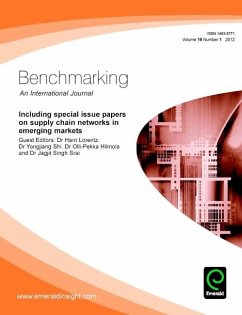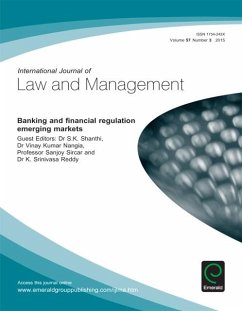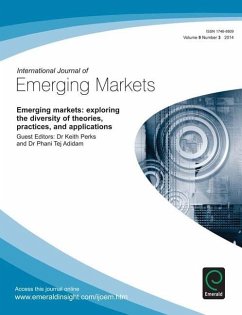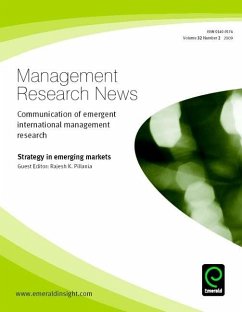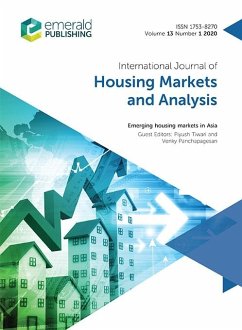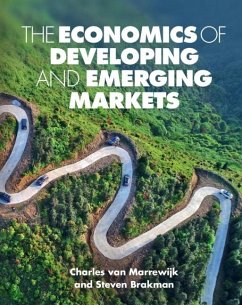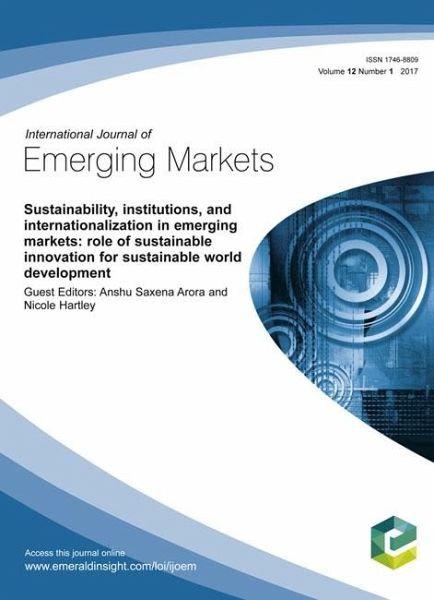
Sustainability, Institutions, and Internationalization in Emerging Markets (eBook, PDF)

PAYBACK Punkte
53 °P sammeln!
As the world leaders vowed to curb greenhouse gases and reduce carbon emissions during the 2015 Paris climate change conference (COP21), there was a visible and uncomforting economic divide between developed and developing economies whereby developing countries blamed richest nations for high carbon dioxide emissions and urged them to help prepare poorer countries for greener energy transition and stave off the early effects of climate change. Firm innovation and internationalization in emerging markets are intertwined with sustainability and the need for sustainable world development. Sustain...
As the world leaders vowed to curb greenhouse gases and reduce carbon emissions during the 2015 Paris climate change conference (COP21), there was a visible and uncomforting economic divide between developed and developing economies whereby developing countries blamed richest nations for high carbon dioxide emissions and urged them to help prepare poorer countries for greener energy transition and stave off the early effects of climate change. Firm innovation and internationalization in emerging markets are intertwined with sustainability and the need for sustainable world development. Sustainable development can be defined as "e;development that meets the needs of the present without compromising the ability of future generations to meet their own needs"e; (World Commission on Environment and Development, 1987, p. 8). Sustainability is critical for the developing world to ensure long-term business success while significantly contributing towards sustainable world development through a healthy environment and a stable society. Both developed and developing economies are utilizing renewable and non-renewable resources; yet Godfray et al. (2010) state that dependency on nonrenewable resources is unsustainable even though it may be needed as a path forward to achieving short-term sustainability. Firms, today, are trying to slow unsustainability, which is different from creating sustainability. Institutions, both formal and informal, facilitate or hinder sustainable business practices. Hence, there is a critical need to incorporate the institutional lens, consisting of regulatory, cognitive and normal dimensions, in exploring sustainable business practices in emerging markets.The sustainability research agenda in emerging markets can focus on varying aspects of sustainable development. The triple bottom line of sustainability focuses on three dimensions - (a) environmental dimension encompasses activities to preserve, protect, conserve and restore ecosystems and natural resources (e.g., climate change policies, preservation of natural resources, and minimization and prevention of toxic wastes); (b) economic dimension of sustainability focuses on increased ROI, revenue and market share increases, lower costs, reduced risk, etc.; and (c) social dimension addresses conditions and actions that specifically affect humanity (e.g., poverty, unemployment, education, health, human rights, etc.). Leonidou, Katsikeas, and Morgan (2013) stated five issues in extant literature considered particularly salient for research in sustainability in emerging markets - (1) external and internal drivers, (2) management, (3) performance outcomes, (4) marketing aspects, and (5) consumer aspects. Further, in sustainability research pertaining to the behavior of firms, nine organizational theories (transaction cost economics, agency theory, institutional theory, organizational ecology, resource dependence theory, the resource-based view of the firm, upper echelons theory, social network theory, and signaling theory) (Connelly, Ketchen, and Slater, 2011) have been found to be relevant in explaining the significance of sustainability related research. In this special issue of the International Journal of Emerging Markets (IJoEM), we raise questions of sustainability, institutions and internationalization in emerging economies akin to those raised by Peng, Wang, and Jiang (2008): (1) What drives firm strategy in emerging markets? (2) What role do sustainable business practices and innovation play in firm success and failure? and 3) "e;How to play the game, when the rules of the game are changing and not completely known?"e; (Peng et al., 2008). In this ebook, we have tried to focus on a diverse portfolio of sustainability research, and highlighted three broad research areas for sustainability with respect to institutions, internationalization and sustainable world development.
Dieser Download kann aus rechtlichen Gründen nur mit Rechnungsadresse in A, B, BG, CY, CZ, D, DK, EW, E, FIN, F, GR, HR, H, IRL, I, LT, L, LR, M, NL, PL, P, R, S, SLO, SK ausgeliefert werden.




